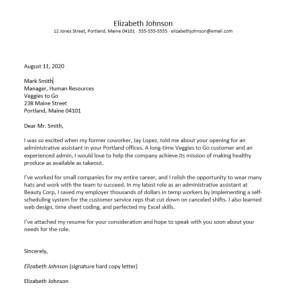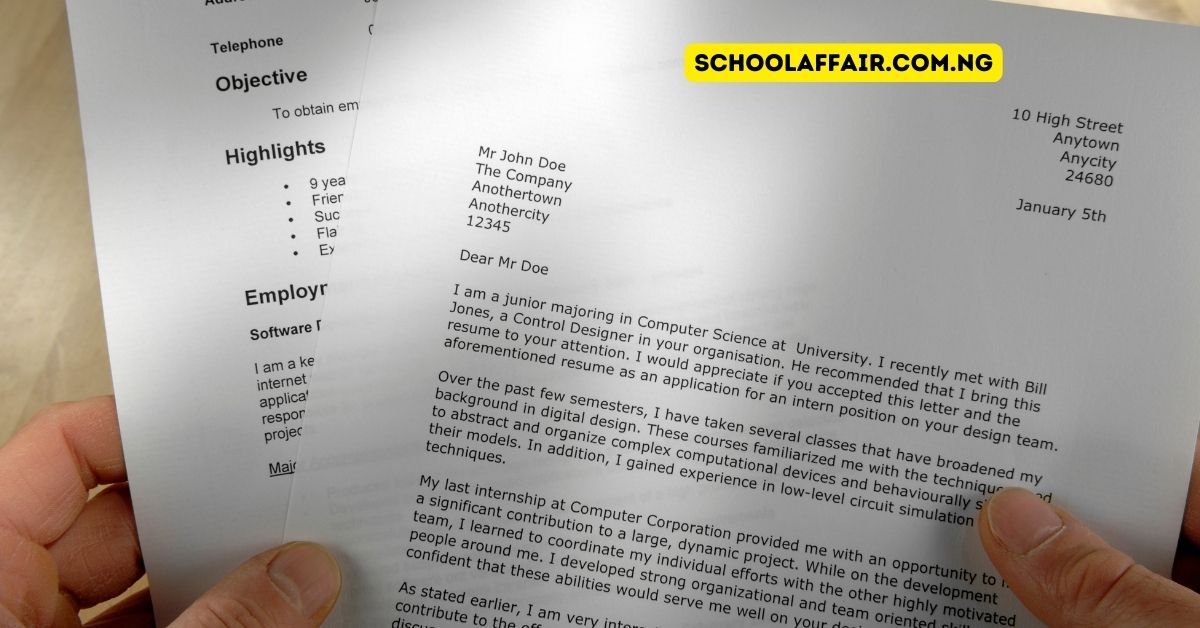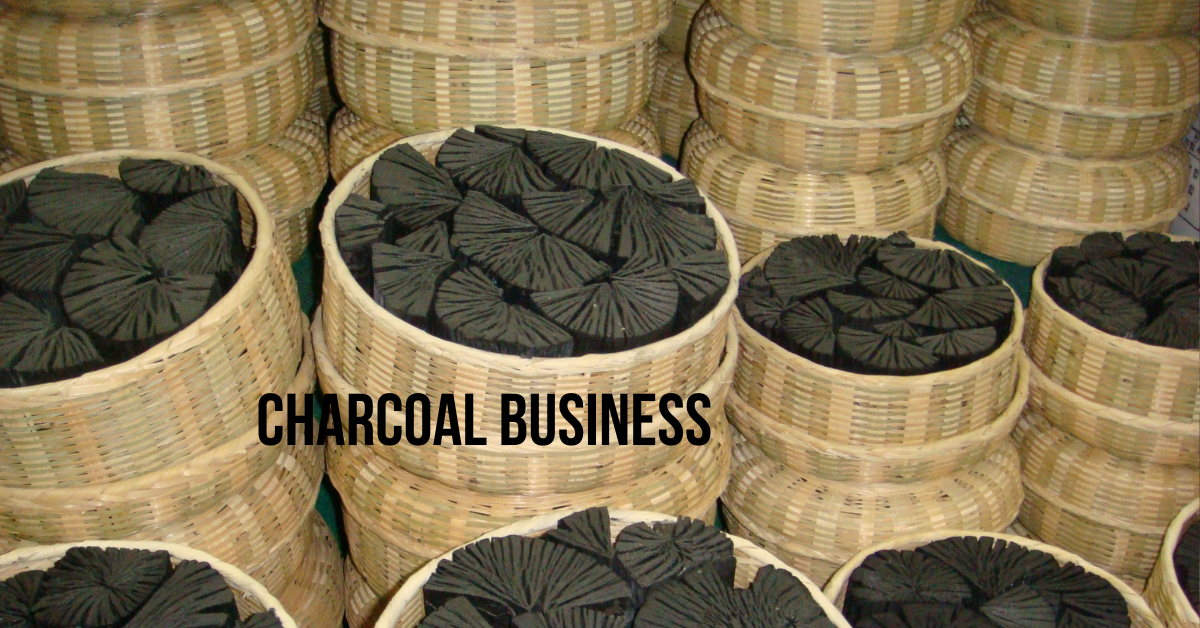In the competitive world of job hunting, it’s crucial to stand out from the crowd. While your resume provides a snapshot of your qualifications, an effective job application letter can be the key to unlocking new opportunities. This comprehensive guide will walk you through the process of crafting a compelling application letter that not only grabs the attention of employers but also sets you apart from other candidates.
Understanding the Purpose of a Job Application Letter
- Understanding the Importance of an Application Letter: Many job seekers underestimate the power of an application letter, believing that a well-crafted resume is enough. However, an application letter serves as your formal introduction to a prospective employer, providing insights into your qualifications and expressing genuine interest in the position. It acts as a personal touch that goes beyond the cold facts presented in a resume.
- The Distinction Between an Application Letter and a Cover Letter: While the terms are often used interchangeably, understanding the differences between an application letter and a cover letter is essential. An application letter typically stands alone, serving as a formal document expressing your interest in a position, even when there’s no advertised vacancy. On the other hand, a cover letter usually accompanies a resume, providing a brief introduction to your qualifications.
- How to Write an Effective Application Letter: a. Start with a Strong Heading: Your application letter should begin with a professional heading that includes your contact information and the employer’s details. This sets the stage for a well-organized and polished letter.
b. Craft a Compelling Salutation: The salutation is your initial greeting and should convey respect. Use “Dear Mr. or Mrs. Last Name” to maintain a formal tone. If the recipient’s name is unknown, opt for a general greeting like “Dear Sir or Madam.”
c. Body of the Letter: i. First Paragraph: In the opening paragraph, clearly state the purpose of your letter. Mention the specific job you are applying for and where you learned about the opportunity. Create a positive first impression by conveying enthusiasm for the position.
ii. Second and Third Paragraphs: These paragraphs are the heart of your application letter. Share relevant experiences, skills, and achievements that align with the job requirements. Provide specific examples of your accomplishments and demonstrate how your qualifications make you an ideal fit for the role.
iii. Last paragraph: summarize your letter, express gratitude for considering your application, and provide information on how the employer can follow up with you. Conclude with a polite and professional tone.
d. Complimentary Close: Sign off with a professional closing such as “Sincerely,” followed by your typed name. For hard-copy letters, include your handwritten signature.

Formatting and Structure
[Your Name] [Your Address] [City, State, ZIP Code] [Your Phone Number] [Your Email Address]
[Date]
[Recipient’s Name] Manager, Human Resources [Company Name] [Company Address] [City, State, ZIP Code]
Dear [Recipient’s Name],
I was thrilled to learn from my former colleague, [Colleague’s Name], about the administrative assistant position at your Portland offices. As a dedicated Veggies to Go customer and an adept administrative professional, I am eager to contribute to the company’s goal of making healthy produce as accessible as takeout.
Throughout my career in various small companies, I have gained valuable experience in handling diverse responsibilities and collaborating with teams to achieve success. In my most recent role as an administrative assistant at [Previous Company], I implemented a self-scheduling system for customer service representatives, resulting in significant cost savings by eliminating the need for temporary workers. Additionally, I expanded my skill set by learning web design, time sheet coding, and honing my Excel proficiency.
I have attached my resume for your review and would welcome the opportunity to discuss how my skills and experience align with the needs of the administrative assistant role at Veggies to Go.
Thank you for considering my application. I look forward to the possibility of speaking with you soon.
Sincerely,
[Your Full Name] (signature for hard copy letter)
To write an effective application letter, follow these tips: always write an application letter unless instructed otherwise; use a formal business letter format with appropriate margins, font size, and spacing; tailor each letter to the specific job and company; use keywords from the job description to make it stand out in applicant tracking systems; keep the letter concise; and proofread and edit for accuracy and professionalism. Examples include an application letter for experienced candidates and one for candidates with no experience.
This job application letter sample is available for download and reading and is compatible with Google Docs or World Online.
Frequently asked questions
- Can you tell me about yourself?
- Response: I am [your profession] with [X years] of experience in [industry]. I excel in [key skills], and I am passionate about [specific aspects related to the job].
- What interests you about this position and our company?
- Response: I am excited about this position because it aligns with my skills in [specific skills] and I am impressed by your company’s commitment to [mention a specific aspect like innovation, values, or impact].
- What are your greatest professional strengths?
- Response: My greatest strengths include [mention strengths such as adaptability, problem-solving, leadership, etc.]. These have been crucial in my previous roles, enabling me to achieve specific accomplishments.
- Can you describe a challenging situation at work and how you handled it?
- Response: In a challenging situation at [your previous job], I [describe the challenge and your actions]. This experience showcased my ability to develop relevant skills and maintain composure under pressure.
- How do you handle feedback and criticism?
- Response: I view feedback as an opportunity for growth. I appreciate constructive criticism and use it to continually improve. It helps me enhance my skills and contribute effectively.
- What do you consider your greatest professional achievement?
- Response: One of my greatest achievements was [specific accomplishment], where I briefly describe the achievement and its impact. It demonstrated my ability to [relevant skill or competency].
- How do you stay updated with industry trends and changes?
- Response: I stay updated by regularly reading industry publications, attending conferences, and participating in online forums. Networking with professionals in the field also helps me stay informed.
- What do you know about our company?
- Response: I have researched your company extensively, understanding your products, market positioning, and recent developments. This knowledge positions me well to contribute effectively.
- How do you prioritize tasks and manage your time?
- Response: I prioritize tasks by assessing deadlines, urgency, and importance. Creating a detailed to-do list and utilizing time management techniques helps me meet deadlines consistently.
- How do you handle tight deadlines and high-pressure situations?
- Response: I thrive under pressure and tight deadlines by staying organized, breaking down tasks, and communicating effectively with team members. This approach ensures efficient collaboration and timely completion.
- Describe a successful teamwork experience you’ve had.
- Response: In my previous role at [Company], I was part of a cross-functional team that successfully [described the project or task]. My role involved [mention specific responsibilities], and collaboration was key to our success.
- What are your salary expectations?
- Response: I am looking for a salary that reflects my skills and experience. I am open to discussing the details further and believe we can find a mutually beneficial arrangement.
- Where do you see yourself in five years?
- Response: In five years, I envision myself in a [mention a higher-level position] where I can contribute significantly to the growth of the company. I am committed to continuous learning and professional development.
- How do you handle a situation where you disagree with a team member’s ideas?
- Response: I approach disagreements by first understanding their perspective and then sharing my viewpoint. I believe in open communication and finding a collaborative solution that benefits the team.
- What skills do you think are essential for this role?
- Response: For this role, I believe key skills include [mention relevant skills such as communication, problem-solving, technical proficiency, etc.]. My experience and training have equipped me with these skills, making me well-suited for the position.
- How do you handle change and adapt to new environments?
- Response: I embrace change as an opportunity for growth. I adapt quickly by staying flexible, seeking feedback, and approaching new challenges with a positive mindset.
- Can you give an example of a time when you had to learn a new skill quickly?
- Response: In my previous role at [Company], I had to quickly learn [specific skill] to address [challenge or project]. I immersed myself in training, utilized online resources, and successfully applied the skill to achieve the desired outcome.
- What motivates you in your professional life?
- Response: I am motivated by challenges that allow me to apply my skills and contribute to meaningful projects. Recognition for a job well done and the opportunity for continuous learning also drive my professional motivation.
- How do you handle competing priorities when multiple tasks require attention?
- Response: I address competing priorities by evaluating urgency, impact, and deadlines. Effective communication with stakeholders and a strategic approach to task management ensure that all priorities are addressed promptly.
- What steps do you take to maintain a work-life balance?
- Response: Maintaining a work-life balance is crucial for me. I prioritize tasks, set boundaries, and utilize time management techniques to ensure that I can excel professionally while also enjoying personal time and activities.
- Can you provide an example of when you had to lead a team or project?
- Response: In my role at [the previous company], I led a team to successfully [describe the project or initiative]. This experience has honed my leadership skills, including effective communication, delegation, and problem-solving in a team setting.
Conclusion:
In the ever-evolving job market, a well-crafted application letter can be your ticket to success. By understanding its importance, distinguishing it from a cover letter, and mastering the art of writing one, you position yourself as a standout candidate. Follow the guidelines provided, personalize your letters, and watch as your application letters open doors to exciting career opportunities.



